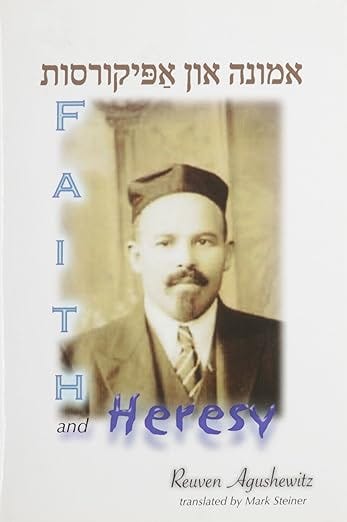I recently bought what is turning out to be one of my most intresting reads of the year. Originally written in Yiddish in 1948 by a fascinating individual named R’ Reuven Agushewitz. Intended to be a polemic against all forms of materialist atheism from the Greeks and Spinoza to Marx and Socialism, the author tries to cover a large portion of the attacks on traditional Jewish belief.
Who would you assume would be able to write such a broad and deep work on secular philosophy? Surely, someone eductaed in a university setting, someone who spent time in the great intelectual hubs of Berlin or Sorbonne such as R’ Hutner or R’ Soloveitchik. The author, Reuven Agushewitz spent not a day in University. A total autodidact, born into a Rabbinic family in Grodno, Lithuania. He spent time in both Mir and Slabodka before turning to Socialism and Zionism, he became a powerful advocate of those ideoligies. At the urging of his father he eventualy returned to Slabodka and recieved semicha there. Later he was appointed Rosh Hayeshiva of Antwerp by his friend R’ Moshe Amiel. He then went and settled in New York, here is an excerpt from his obituary;
His literary work began to flourish in the United States, of which he became a citizen in 5689 (1929). He adopted the following regimen: to content himself with the bare necessities of life, while pursuing a literary career. From then on, he lived the life of an ascetic, taught a few disciples, and occupied a niche in the [New York Public] Library. He had great powers of abstract reasoning, which led him to the study of philosophy. But his common sense, prodigious learning, and clear, straightforward elucidation, strengthened his ties to his disciples and to the Talmud. Henceforth, he had a twofold soul: the soul of a pious Jew, trembling at the word of God, and the soul of the scientist, the scholar, who seeks philosophical truth. Beginning with 5695 (1935), he published three books in Yiddish (besides many newspaper articles): Ancient Greek Philosophy--a sharp criticism of the major trends in Greek philosophy; Principles--a theoretical essay on the nature of existence according to the latest philosophers as well as Talmudic aphorisms; and Faith and Heresy--a sublime work reconciling religion and science, which became widely known in the Jewish world, and which is being published in Hebrew in Jerusalem [It was published in 1951 by Mossad Harav Kook as Emunah u-Kefirah-M. S.] He wrote his commentaries to the Talmud in the margins. He left elucidations and emendations on Nezikin, Nashim, and Mo'ed. Bi'ur Reuven to Bava Kamma1 (with approbations from R’ Aaron Kotler and R’ Joseph B. Soloveitchik) is one example. One of his disciples, well known philanthropist Harry Fischel, founder of the Institute which bears his name in Jerusalem, encouraged him to prepare his commentaries for publication. For this purpose he moved to Israel--but fortune was not kind to him (He passed away early there). As the Talmud says of the purely righteous, his work was now finished by others.
So here we have an exceptionally unique individual. On the one hand, deeply steeped in the classical lithuanian method of critical talmud study. While also having seemingly just as deep knowledge of Kant, Hegel, and Bergson. Spent time in yeshiva but was also pulled towards the powerful movements of his time. A true master of two Worlds.
Something else stands out to me about him. It seems like he took philosophy seriously. He wasn’t content to take a spoon fed ideaology, the path of least resistance. He felt a need to experience the world first hand, not having been sifted through the sieve of the community around him. That I feel is something hard to find in the frum community today. Yes, we have the kiruv apologetics genre and we have many great institutions focused on perpetuating learning in the dialectical style of Volozhin, but great philosophers? We produce none of those. It seems to me that to be someone with great convinction in your beliefs you must at some point in your life have had the experience of having no conviction in any of them. Hence, Emunah with Apikorsus. And only with it.
https://www.amazon.com/Faith-Heresy-Reuven-Agushewitz/dp/0881259101
If you are learning Bava Kama, his sefer can be found online on sefaria here: https://www.sefaria.org/Beur_Reuven_on_Bava_Kamma?tab=contents



